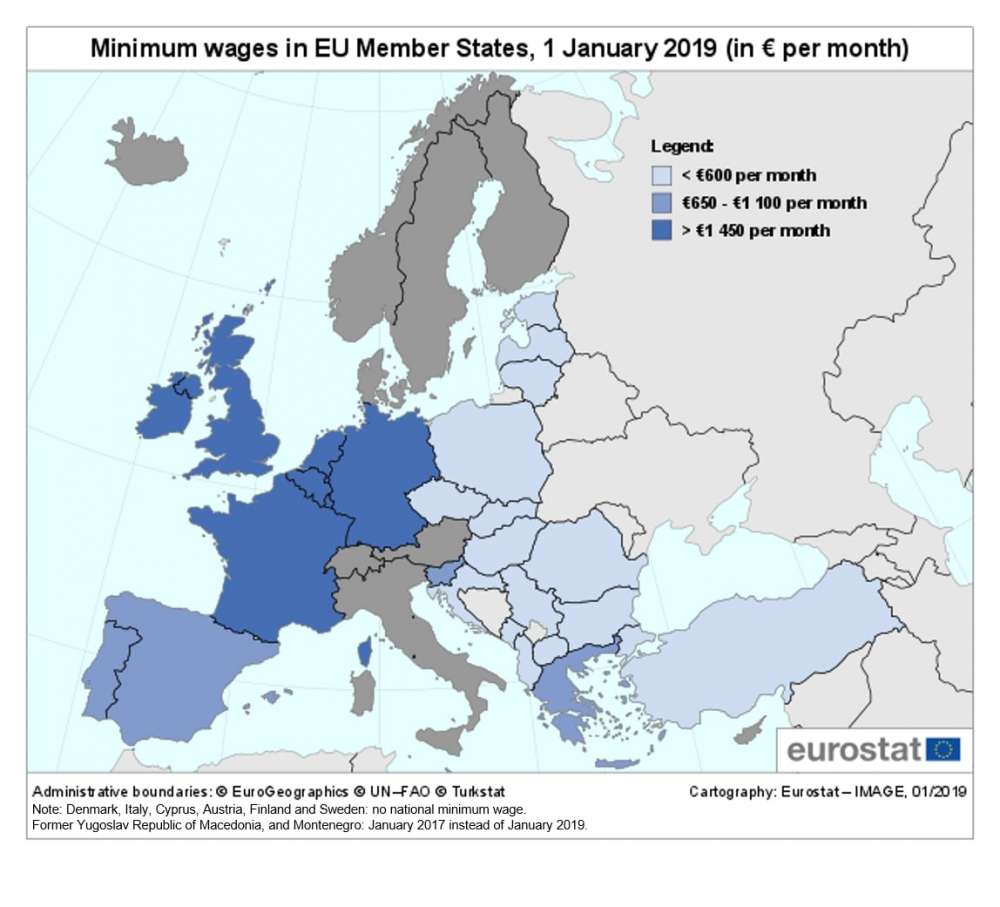As of 1 January 2019, 22 out of the 28 Member States of the European Union (EU) have national minimum wages: only Denmark, Italy, Cyprus, Austria, Finland and Sweden do not have any. The 22 EU Member States that have national minimum wages can be divided into three main groups based on the level in euro.
Currently only nine professions in Cyprus are protected by a minimum wage which is set by Labour Ministry decree.
A minimum wage applies to the following professions: clerks, nursing assistants, kindergarten and nursery schools assistants, school aides and carers. It starts at €870 gross a month and rises to €924 after six months. Security guards receive an hourly minimum wage of €4.90 which after six months of employment at the same employer must rise to €5.20 an hour. Cleaners must receive a starting minimum hourly wage of at least €4.55 which rises to €4.84 an hour after six months. The minimum wage has remained the same since 2012.
Wages in other professions are set by collective agreement.
Monthly minimum wages generally below €600 in east and above €1 400 in northwest of the EU
In January 2019, Bulgaria had the lowest gross* minimum wage (€286) across the EU. Nine Member States, all also located in the east of the EU, followed with minimum wages between €400 and around €600 per month: Latvia (€430), Romania (€446), Hungary (€464), Croatia (€506), Czechia (€519), Slovakia (€520), Poland (€523), Estonia (€540) and Lithuania (€555).
In five other Member States, located in the south of the EU, minimum wages ranged between €650 and just over €1 000 per month: Greece (€684), Portugal (€700), Malta (€762), Slovenia (€887) and Spain (€1 050).
In the remaining seven Member States, all located in the west and north of the EU, minimum wages were above €1 450 per month: the United Kingdom (€1 453), France (€1 521), Germany (€1 557), Belgium (€1 594), the Netherlands (€1 616), Ireland (€1 656) and Luxembourg (€2 071).
For comparison, the federal minimum wage in the United States was €1 098 per month in January 2019.

The source dataset is available here.
Smaller gaps in minimum wages once price level differences are eliminated
Across the 22 Member States concerned, the highest minimum wage in the EU was more than 7 times higher than the lowest.
However, the disparities in minimum wages across the EU Member States are considerably smaller once price level differences are eliminated: minimum wages in Member States with lower price levels become relatively higher when expressed in purchasing power standard (PPS), and relatively lower in Member States with higher price levels. By eliminating price differences, minimum wages ranged from 557 PPS per month in Bulgaria to 1 646 PPS in Luxembourg, meaning that the highest minimum wage was almost 3 times higher than the lowest.
Further information is provided in the Statistics Explained article Minimum wage statistics.
Read more:
https://in-cyprus.com/cyprus-working-youth-at-increased-risk-of-poverty/






